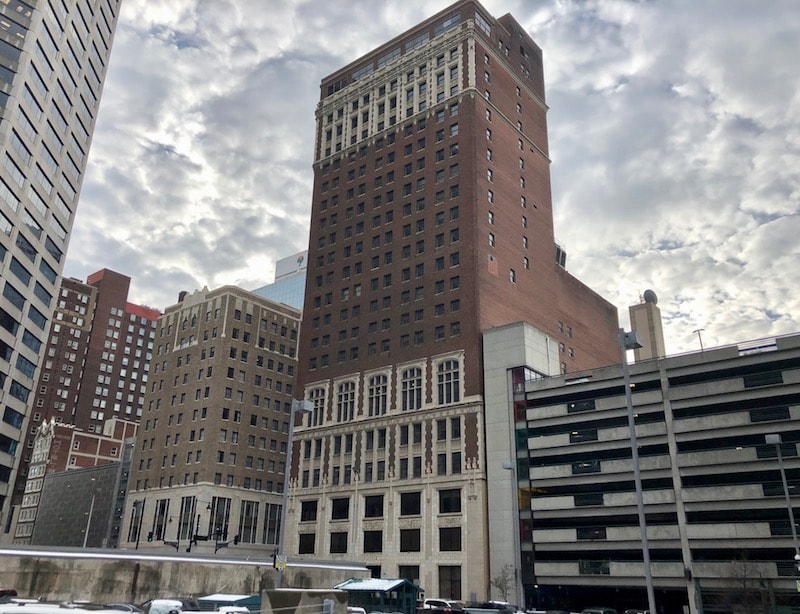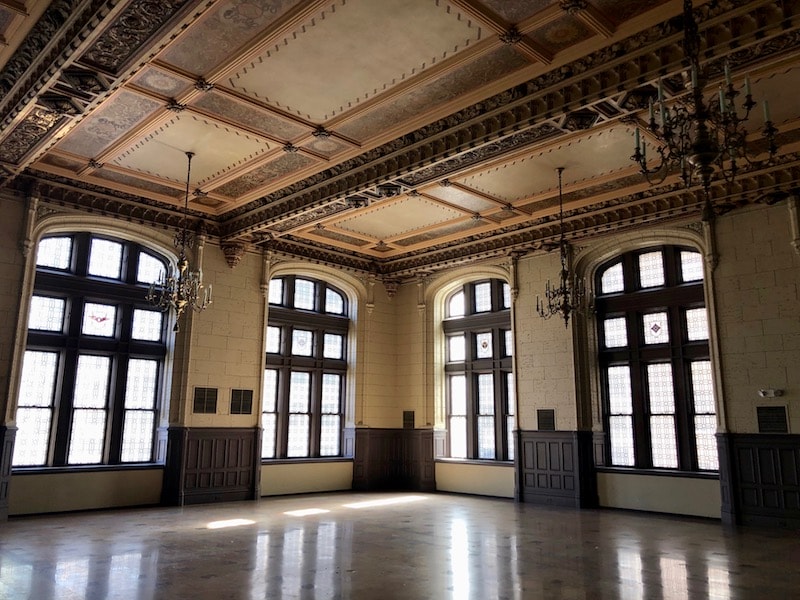One of Downtown’s Last Big, Empty Historic Buildings Slated for Apartments

Published November 29th, 2018 at 1:15 PM
By Kevin Collison
One of downtown’s last prominent, dormant historic buildings, the 23-story Mark Twain Tower, is slated to be redeveloped as a 202-unit apartment project following approval of incentives Wednesday.
The soaring structure at the northwest corner of 11th and Baltimore, which opened in 1923 as the Kansas City Athletic Club, is expected to become the latest in a long line of projects that have converted a score of obsolete office buildings into new residences and hotel rooms.
The Bernstein Companies of Washington D.C. plan to spend $51.9 million redeveloping the building with completion estimated in November 2020.
It’s the firm’s first project here, and company representative Phil Aftuck told the board of the Land Clearance Redevelopment Authority his firm is bullish on downtown.
“We’re long term players,” Aftuck said. “We plan to be here awhile. We like the Kansas City market.”
The LCRA board approved a 90 percent property tax abatement for 10 years, and a sales tax exemption on construction materials to help make the project financially viable.

The original two-story ballroom remains in good condition and will be preserved as part of the redevelopment project. (Photo by Phil Aftuck)
Even though the estimated initial return on investment was lower than average, according to an LCRA consultant, Aftuck said his firm is confident it will prosper as downtown continues to revive.
“I think Kansas City is going in the right direction,” he said. “A development done right will do well.”
For city development officials and the Downtown Council, Bernstein Cos. decision to take on the 253,000 square-foot building at 106 W. 11th St. was a huge relief. Other developers have tried and failed in recent years to come up with a viable plan for reusing the property.
“There’s been at least three developers, perhaps four, who have made a run at this,” said Greg Flisram, senior vice president of Re/Development for the KC Economic Development Corp.
“The need for tax credits is now. If not, it stays dark and will be subject to everything that happens to vacant buildings.”
Adding to the urgency: state historic tax credits valued at $4 million granted to a previous developer are due to expire Dec. 15 if $5 million is not spent on redeveloping the property. The project also is eligible for federal historic tax credits valued at $4.7 million.
Aftuck said his firm wants to begin work immediately to meet the historic tax credit deadline.
The Mark Twain Tower has had a complicated history from the start.
Construction actually began in 1917 but delays pushed back its completion to 1923, according to its National Register of Historic Places application. It’s part of a half dozen downtown hotels that make up historic Downtown Hotel District.

The entrance to Mark Twain Towers is relatively new, but the original terra cotta detail work remains.
It was designed in the Late Gothic Revival style by the Hoit, Price & Barnes architectural firm. When it opened, its athletic club included a near Olympic-size swimming pool, a gymnasium, squash and racquet ball courts, and a two-story ballroom.
Those amenities, which will be preserved as part of the redevelopment, occupy more than half the space in the building but will generate little revenue.
“We will have the best (resident) amenity space in Kansas City,” Aftuck said.
In 1938, the building was renamed the Continental Hotel. It remained a hotel until the mid-1970s when it was converted to an office building. During the late 1970s, it housed the Kansas City Playboy Club.
In recent years however, its occupancy has declined precipitously and its last tenant moved out more than six months ago.
The current plan calls for it to be renovated into 141 one-bedroom and 61 two-bedroom apartments, according to documents submitted to the LCRA.
Aftuck estimated the monthly rent for a one-bedroom unit will be about $1,600 and a two-bedroom unit a little over $2,000.
“This is not a high-end luxury development but middle of the road,” he said. “We think there’s a niche in the market.”
There will be no parking developed as part of the project, although plans call for about 100 spaces to be leased in nearby garages.
Developers believe many tenants will be millennials without cars who will use the streetcar, electric scooters and ride services like Uber and Lyft to get around.
With the redevelopment of the Mark Twain Tower, only one prominent historic downtown building remains, the former Federal Reserve Bank of Kansas City building at 11th and Grand, according to Bob Mayer of M.R. Capital, a consultant on the Mark Twain project.
Plans are in the works however, to redevelop the old Federal Reserve Bank building into an Embassy Suites hotel.

The tile swimming pool from the original Kansas City Athletic Club is in need of restoration. (Photo by Phil Aftuck)


